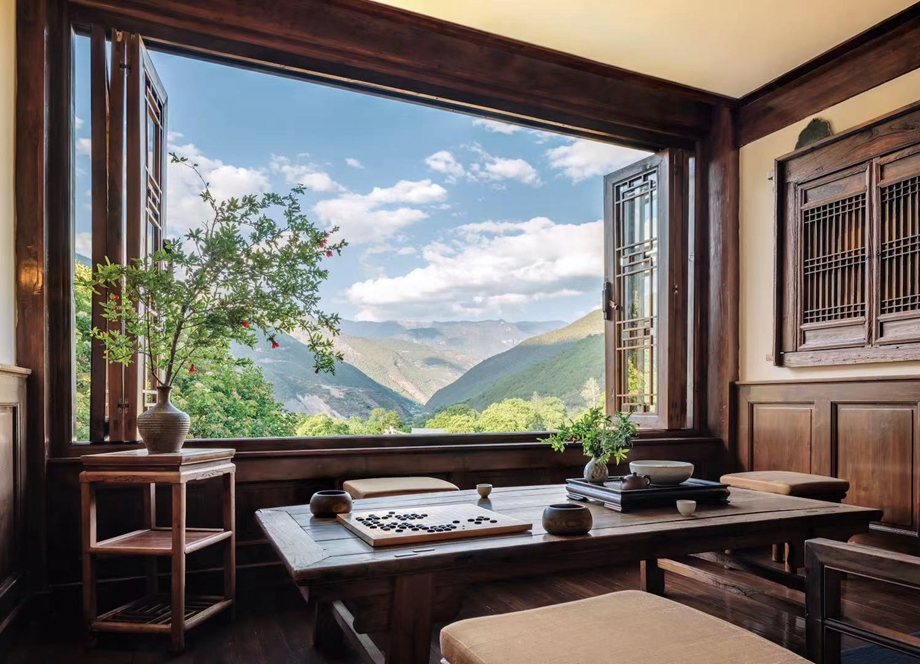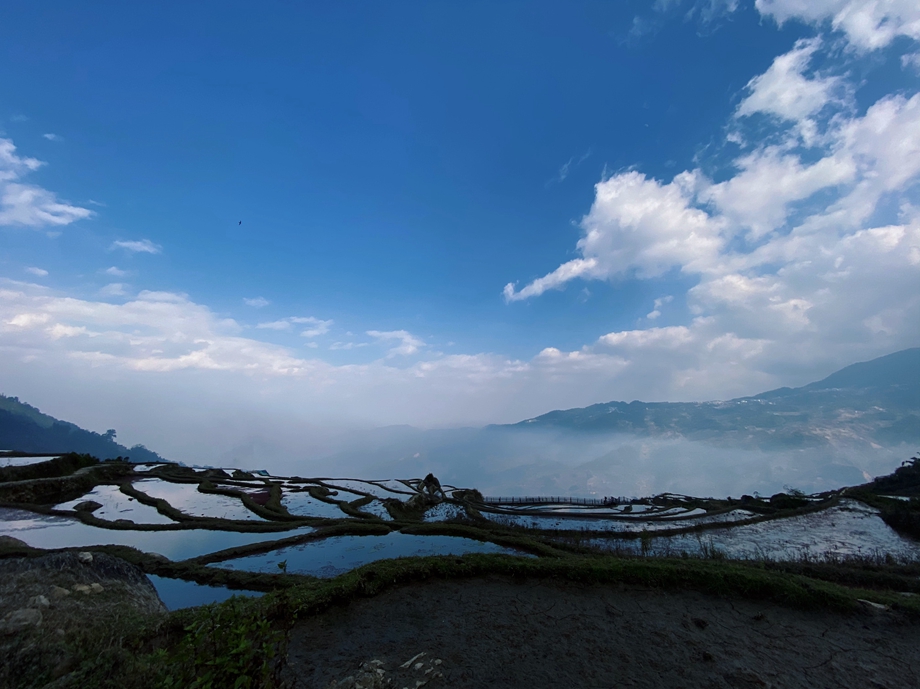Banshan hotels: new tourism products of Yunnan
Editor's note:
Like pearls scattered along the West Yunnan Tourist Loop, the Banshan hotels, blending with their respective surrounding environment, are collections of healthcare and recreational facilities. Experience-centered, the hotels are resort-type ones providing diverse and personalized services for tourists. From last year on, Yunnan has built various types of Banshan hotels which are entitled as forest hotels, snow-mountain hotels and terraced field hotels. Now, checking in Banshan hotels are climbing onto the list of must-do things of many tourists when they travel in Yunnan.

Banshan hotels: new tourism products of Yunnan
In Chinese, the word “Banshan” literally means “half-mountain” and sounds the same as another word which has the meaning of “companion of mountains”. As the name suggests, the Banshan hotels are built in the mountains or at the foot of them, while surrounded by beautiful views. As far as their functions are concerned, the hotels are experience-centered and vacation-featured. Unique as they are, they have also become new tourist products of the province. Now, staying in Banshan hotels has gained popularity among tourists to Yunnan.
More than hotel
Situated close to the Pu’er Taiyang River National Forest Park, the Xiaoxiongmao Manor Hotel is the only lesser panda-themed hotel in China and dubbed by many tourists as “the hotel growing in forests”.

Last year, the phase-II project of the hotel went into operation. Unlike the phase-I which is marked by Chinese decorations, the new part is decorated and furnished in Southeast Asian styles. “As Pu’er City borders Southeast Asia, we have our considerations in this regard,” said Li Fucheng, assistant to the general manager of the hotel. He said the hotel blends two decoration styles to cater for different demands of domestic tourists and those from Southeast Asian countries.
Though the decoration style changes from phase-I to Phase-II, the Xiaoxiongmao Manor Hotel has never faltered in its pursuit of providing high-quality experience-centered tourist products. To meet the needs of high-end customers, the hotel rolled out various products like forest trekking, ethnic cultural experience and tea picking and making.
Xu Wenfeng is a local villager-turned staff member in Xiaoxiongmao. Talkative and hardworking, he has grown up to be a trekking guide of the hotel’s forest experiencing center. In different seasons, the center will organize different themed activities with biodiversity conservation as their cores. The job of Xu Wenfeng and his colleagues is to guide the tourists through the forests, while introducing them knowledge about animals, plants and fungus. The forest trekking has popularized bio-diversity knowledge and arouses tourists’ awareness of protecting bio-diversity.
“This job is a professional one and we need to update our knowledge each day,” Xu said he had consulted experts in Pu’er City in his leisure time in order to explain the knowledge of forest to tourists in a simple and vivid way. He added that the coming of tourists had also increased the bio-diversity protection awareness of local villagers. “It’s becoming a consensus among them that bio-diversity is important for growing high-quality tea.”

For two decades, the Songtsam Resort Group has been dedicating itself to creating holistic tourism products featuring “More Than Hotel” in Yunnan. And now Songtsam has got a clearer plan to promote its own integrative development in building Banshan hotels.
“Actually, Banshan hotels are tourist destinations,” Zhishi Qilin, CEO of Songtsam, shared his views on the nature and function of Banshan hotels when receiving an interview by our reporters recently. According to him, Songtasm has promoted the integration between its own hotels with local natural landscapes, boutique hotels and culture. By doing so, the group has created unique experience-centered tourist products like “Exploring the Three Parallel Rivers”“Trekking through the Hengduan Mountains”and “Visiting Shangri-la” . He said that the “More Than Hotel” strategy proved to be successful.
Part of the nature
“Wherever we built at Banshan hotels, we bear in mind the sustainable ideals of green, ecology, environmental protection and coexistence. Only by following these ideas can we build Banshan hotels into tourist destinations with idyllic beauty,” said the person in charge of Vinetree, an ecological tourism company. The case of Vinetree has set an example for Banshan hotel builders to uphold the ideal of “harmony and co-existence”.

Vinetree is now building and operating Banshan hotels in Honghe County, southeast Yunnan’s Honghe Hani and Yi Autonomous Prefecture. The hotel is composed of two parts, namely the Honghegu Tented Resort and the old Suhong Village. Built on the old site of a deserted Hani village and facing the Samaba Terraced Fields, the former has been put into operation in 2017, while the latter is still under renovation. In the Honghegu resort, all the 17 room tents stand on the original sites of old houses, retaining the characteristics of the old Hani village. The builders have taken into consideration both the tourists’ needs and the protection of the old village, making the resort part of the nature.
In the renovation of old Suhong Village, the traditional ideal of “Human and nature live in harmony” of the Hani people is also adopted. The village is designed to feature one of the four elements (forest, village, terrace and river) that make up the typical ecological landscape of the Hani terraced fields. One of its aims is to pass on the Hani culture and traditions like bamboo-weaving, embroidery, rice-growing and pottery making.
Xiaopuxi is a village with 15 Jinuo households in Jinuoshan Township, Jinghong City, south Yunnan’s Xishuangbanna Dai Autonomous Prefecture. Located deep in the mountains, Xiaopuxi boasts good eco-environment and well-preserved Jinuo culture. For the villagers, April 10 of this year is a day worth commemorating. On that day, the Xiaopuxi Ecological and Smart Hotel, the first Banshan hotel in Jinuoshan Township, started construction in the village. And it will be put into operation in June.

From the very start of its planning, ecology and smartness are designed as its intrinsic nature of the Xiaopuxi Hotel. “The good eco-environment and well-preserved Jinuo culture are the most valuable assets of Xiaopuxi. The very first day we came to Xiaopuxi, we have been thinking to build the hotel as an inseparable part of local eco-environment, the village and the culture,” said Fu Congwei, deputy general manager of the Xband Culture and Tourism Group, which is one of the investors of the hotel.
Helping rural revitalization
“We don’t have to make money far away from home while leading a better-off life in hometowns.” For many local farmers in Honghe County, the construction of Vinetree’s Banshan hotel has created jobs. From the building of Honghegu Tented Resort to the renovation of old Suhong Village, it has been Vinetree’s priority to hire local workers. Now, the tourism company is providing more jobs to locals. Each day, 50-200 local people work in the renovation site of Suhong Village. And in the Honghegu Tent Resort, 95% of the personnel are from surrounding villages.
Banshan hotels have lent impetus to rural development and helped increase farmers’ income. Besides hiring local people, Xiaoxiongmao Manor Hotel has rolled out experience-centered tourist products which have promoted the development of local villages. For example, the Pu’er tea picking and making has brought in more income for locals.

In Dali, the Mutian-Shijian Yeshe Designers’ hotel has built reciprocal economic relations with local people. For meeting the tourists’ need, the hotel joins hands with locals to provide experience-centered products like tea-making, handicraft-making and farming. Meanwhile, the hotel focuses on product designing, and entrusts local villagers with the making, so as to increase their income.
After the lunch of construction of Xiaopuxi Hotel in Jinuo Township, local villagers are longing for a better future. Mu Dandan is the inheritor of plant dyeing of the Jinuo Kandao cloth. Besides dyeing cloth, Mu and her husband lead a life on tea picking, tea making and rubber tapping. Thinking about that the Banshan hotel may invite in more tourists, the couple is planning to build a homestay where tourists can experience cloth dying, tea-picking and making.
For Zhishi Qilin, the Songtsam Banshan hotel has established connectivity with local farmers. He said that though the Banshan hotels are not large in size, they served as engines for local development. “We hire local people. Meanwhile we also promote local industrial development and cultural protection. What we are doing is to the benefit of rural revitalization,” he said.

Writing by Zu Hongbing, Han Jiami, Liu Ziyu and Hu Lixian; Translating by Zu Hongbing